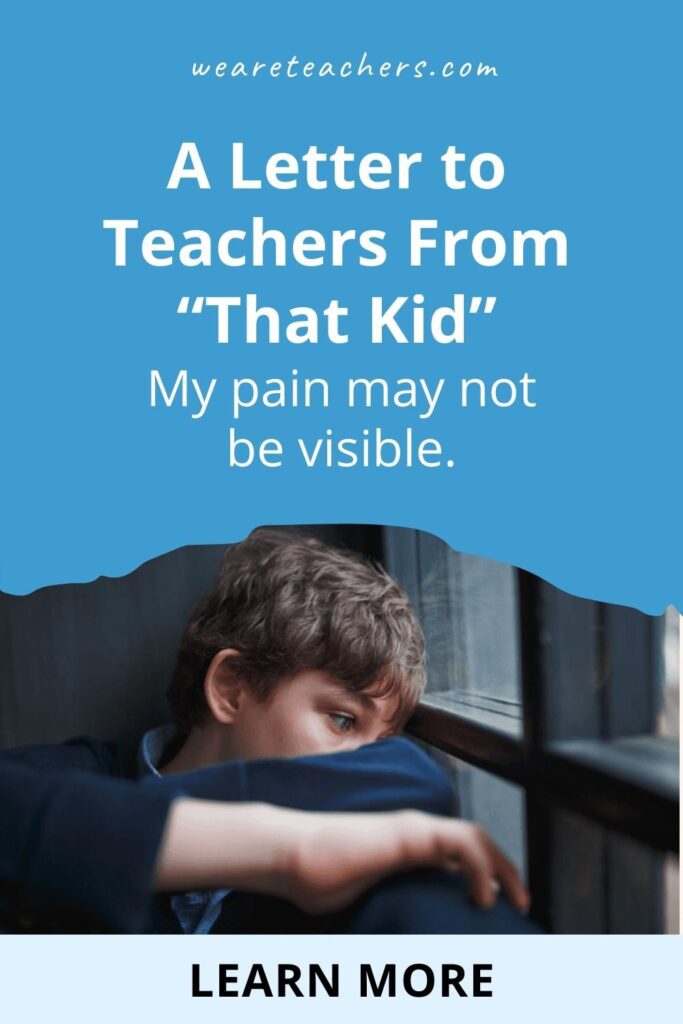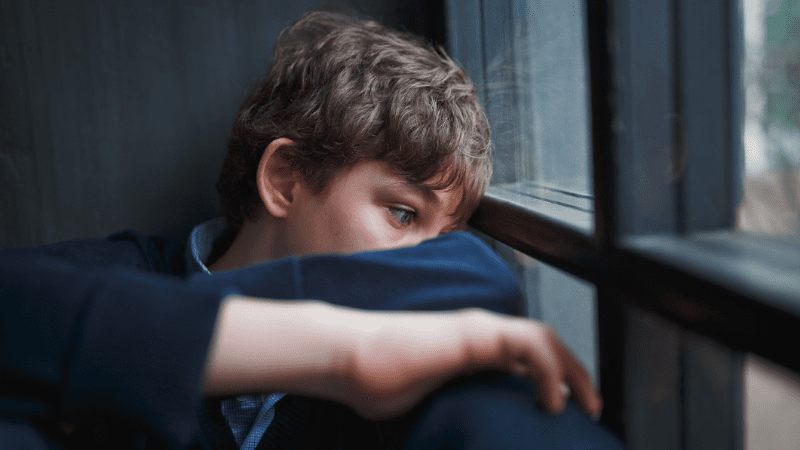Dear Teacher,
I know I need no introduction, but I’m that kid.
You know. That kid.
Sometimes I’m physically destructive. I tornado through your carefully arranged stations. Throwing is my forte—chairs, books, the whole pencil container, you name it. I regularly hit, slap, or bite.
Or maybe my actions are more verbal. I use language to harm others—including you. My finesse with words can make my peers (and occasionally teachers) cry. With a simple sentence, I can take down the energy of an entire classroom.
Other times I’m highly skilled at nonverbal communication. A well-timed finger the second you turn around. An eye roll. A dramatic sigh. I can even make a cough condescending.
But please do me a favor.
View my behavior as communication, not a personal attack.
Sometimes (and I know this can be hard to hear), I’m trying to communicate that I need more from you as a teacher. I might feel like you don’t know what you’re doing or don’t have control of our classroom, and that instability is frustrating. I might observe that you show preference (or disdain) for certain students. It’s possible that I’ve picked up on the distaste you have for certain aspects of your job, which in turn feels like distaste for me.
These aren’t justifications for, say, when I throw a grape from across the room and laugh hysterically when it nails you in the back of the head. Clearly I made a bad choice. But it might show you where the frustration behind that bad choice comes from.
Other times, it’s not about you at all. You could be the most wonderful, kind, talented teacher, but something else is getting in my way. It might have nothing to do with what’s happening in the classroom.
I’m a good kid—I think you know that. There are so many things I care about. I have skills and strengths that I want to use to help other people. In fact, I want for you to know all these good things about me.
But unfortunately, you don’t always get to see these good things.
I may be afraid. I might be in pain.
You know how if you put oil and water in a container together, the oil will float to the top? It’s like my fear and pain are the oil, and all the good things about me are water. Every once in a while, you might shake me up and see just a glimpse of those good things on the surface, but no matter how hard I try, the fear and pain will bubble up and cover everything again. It’s easy to think that the way I react to fear and pain—the anger, the defiance—is the real me. In fact, I’ve even started to believe it.
People often think the only way I could act this way is if I’m facing violent, abusive, or neglectful treatment at home. And while this can be the case, it’s important to recognize this isn’t always the case. Making assumptions about my home life isn’t fair to me, my parents, or other students like me.
It could be that I spend a lot of time thinking really deep and scary thoughts about the state of the world and what might happen to my family or me—especially after worrying my way through a pandemic for two years.
I might not know what to do with big feelings.
Maybe I don’t feel like I belong, and I’m afraid to say this to anyone.
I might be terrified about something I saw online at a friend’s house once.
Perhaps the pressure to be perfect or different is so intense and crushing that I believe I’m a failure.
I could be learning a very dangerous message in some situation outside of home, or inside my own head. Maybe something has happened that nobody knows about but me, and I do a really good job of faking that I don’t care.
Maybe you look at me and think there’s no excuse for the way I behave. You might think, “This child has a stable family, loving parents, and a secure environment. I know kids with a lot less who behave perfectly fine.”
But please remember that there is always more than what you see.
I know that I’m making things hard for you. I know you don’t deserve it. But I feel like you should know this: I want the same things everybody else wants. Belonging. Not being worried or scared. I want to be good at something.
I don’t know how to fix the way I’m feeling (or I would have done so already). And it’s not your responsibility to fix me. But here’s how you can help.
Start small. Don’t ask me to open up right away about my fear and pain.
Show me that you notice me—not my behavior, but something about me.
Ask me questions. Light, low-stakes questions, not therapist questions (unless you’re a mental health professional and this is your job). Start with who makes the best fast-food breakfast sandwich.
Don’t give in when I try to rile you up. When you stay calm, I have a strong example of emotional regulation.
Maybe, slowly, I will learn to trust you. Or maybe I won’t, and that’s OK too. Despite what problematic narratives about teaching may try to portray, I don’t need “saving.”
It’s enough to show me patience and kindness. It’s enough to give me a clean slate. It’s enough to be a dependable person while you’re my teacher.
Love,
That Kid
We’d love to hear—what have been your experiences teaching “that kid”? Let us know in the comments.
Looking for more articles like this? Subscribe to our newsletters!

